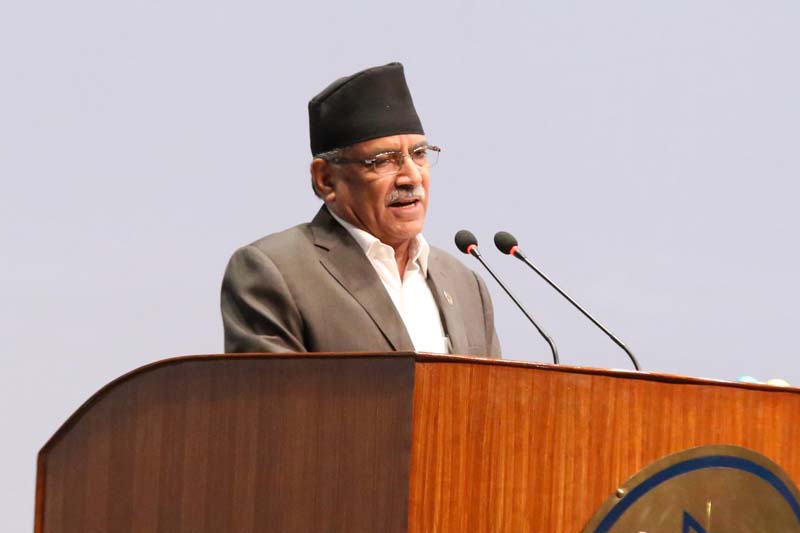Constitution amendment before Chhath in consensus: PM
KATHMANDU: Prime Minister Pushpa Kamal Dahal on Wednesday said a Constitution amendment proposal would be put forward to the House before the upcoming Chhath festival in consensus of major political actors of the nation.
While addressing the Parliament to inform about his visit to Goa of India to take part in the BRICS-BIMSTEC Outreach Summit earlier this week, he said discussions were underway for the same so as to table the proposal within next three weeks.
Dahal claimed the draft of the proposal was at its final stage.
He, however, conceded that dialogues so far had not been much fruitful; hence, the government was doing further homework to make the discussions more fruitful.
It was the government's top priority to conclude the Constitution amendment process in consensus of the main opposition CPN-UML and agitating parties and groups, including Madhesis, Tharus and Janajatis, he claimed.
"I want to assure you," he said, addressing the disgruntled groups, "Your genuine concerns will be addressed."
He, meanwhile, informed that local body restructuring process was moving ahead in consensus of major political parties.
Dahal was confident that local body elections would be held by mid-April after the Local Body Restructuring Commission would submit its report on time to ensure implementation of the Constitution.
Meanwhile, the Prime Minister also took the opportunity to inform lawmakers about the government initiatives for relief of last year's earthquake survivors and victims of floods and landslides in various parts of the nation including Pyuthan district this monsoon.
He also said the government was implementing various promises he had made during his address to the House on September 8.
Briefing on Goa trip
Meanwhile, PM Dahal claimed he used the recent India visit for the BRICS-BIMSTEC Outreach Summit to ensure effective implementation of past agreements signed with India.
He said India had agreed to proceed with the financial cooperation pledged for major development projects including the Pancheshwor Multipurpose Project.
"This visit has helped us to strengthen Nepal-India ties existing for a long," he said.
He also said bilateral meetings with leaders of India, China, Bhutan, Sri Lanka and South Africa were fruitful in developing ties with them.
The Prime Minister reiterated that his "joint meeting" with Indian PM Narendra Modi and Chinese President Xi Jinping was a "happy coincidence" and it should not be dragged into "unnecessary comments."
"I feel proud that I could utilise the rare opportunity, which could be impossible if it was planned," he said, urging, "Baseless comments could affect our relationships with our neighbours."
Earlier, the PM's Secretariat had portrayed the meeting as a "trilateral meeting", which had drawn criticisms from various political parties as a breach of diplomatic etiquette.
He informed the legislative body that the Chinese President had assured him to visit Nepal at the earliest, if not this year.
Defence of controversial communique
Dahal also reiterated that the controversial 25-point joint Nepal-India communique did not undermine sovereignty and independence of the nation as alleged by the opposition.
The two nations had issued the communique in Dahal's state visit to India in mid-September. The statement was dragged into controversy for it had a point which mentioned that Nepal would form its official opinion on international issues in line with that of India.
The PM, however, defended that such practices were common in the global diplomacy and it was not a deviation from Nepal's independent foreign policy.
Neither was it a military alliance, thus no one should fear from the move, he urged.
Dahal also defended his Cabinet's one of the early decisions to send special envoys to India and China. "Both of the neighbours have appreciated our decision to send the special envoys," he said.
"Both of the neighbours have appreciated our decision to send the special envoys," he said, claiming the visits improved the ties including preparations for upcoming visits of Indian and Chinese presidents to Nepal.
The main opposition CPN-UML had objected to the decision claiming such envoys are sent only in special critical conditions like wars.
Without mentioning the UML, the PM in his around 45-minute long address had frequently targeted the opposition party, thereby rejecting the accusations it had made against his government on various occasions.
READ ALSO:






